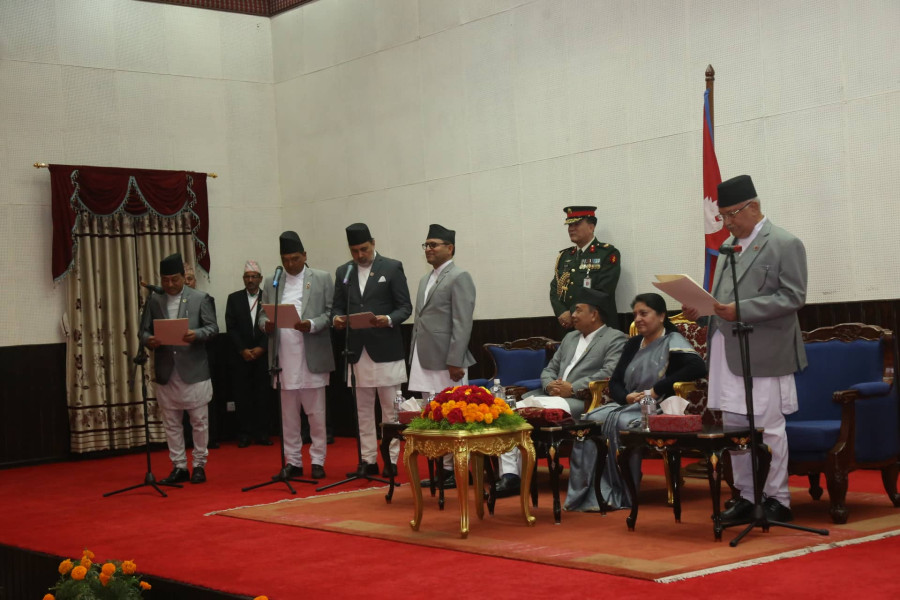Politics
Oli’s Cabinet reshuffle aimed at managing party factions rather than improving results
Instead of addressing public grievances with underperforming ministers, the prime minister has seized the opportunity to placate factions, party leaders say.
Tika R Pradhan
Despite widespread expectations that Prime Minister KP Sharma Oli was going to reshuffle his Cabinet to address public grievances with underperforming ministers, the reorganisation has just balanced the party equation, according to party leaders.
On Wednesday night, Oli sacked six ministers from his 22-member Cabinet and inducted new faces. All three state ministers were also replaced. While the reshuffle was much awaited, the form it finally took was more of an attempt to address internal party dynamics, as Oli will soon fly abroad for his kidney transplant, leaders said.
After a daylong exercise, which included meetings with Co-chair Pushpa Kamal Dahal, President Bidya Devi Bhandari and the party secretariat, Oli managed to pull off a coup, said one party leader, who spoke on condition of anonymity so he could freely discuss intra-party dynamics.
Through the Cabinet reshuffle, Oli has managed to placate all of the ruling party’s internal factions, the leader told the Post.
One of the surprise entrants into the Cabinet is Ghanashyam Bhusal, who has long been a vocal critic of Oli’s governance style. But Bhusal has close relations with senior leader Madhav Kumar Nepal. Last week, Oli held a series of meetings with Nepal, just months after their relations soured over a decision to relegate Nepal to the fourth rank in the party. Bhusal’s appointment comes on the backs of those meetings with Nepal, said the leader.
Similarly, Lekhraj Bhatta and Rameshwor Raya Yadav, who represent the Dahal faction, have been given the Ministry of Industries, Commerce and Supplies, and the Ministry of Labour, Employment and Social Security, respectively. And despite a better performance, Gokarna Bista faced the sack while Bina Magar, heavily criticised for her non-performance, has retained her post as minister for water supply. Magar is Dahal’s daughter-in-law.
Mani Thapa, a standing committee member, said the main objective of the Cabinet reshuffle was to address internal conflict in the party.
“All the resources of the government and the party have been centralised just to resolve internal problems,” said Thapa. “Ministers have been selected to serve the interests of the leaders and party factions. This reshuffle was also aimed at instilling fear among ministers that they can be shown the door any time.”
Oli also seized the opportunity to reward Rambir Manandhar, who was appointed a state minister. Manandhar in October last year had resigned as a Member of Parliament “of his own volition” to make way for Bamdev Gautam, whom Oli plans to elevate to the post of party vice-chair.
“Though it was said that Cabinet will be reshuffled on the basis of performance, it seems that factional bias and transactions were taken into account,” party leader and former minister Prabhu Sah wrote on Facebook. “We have once again become ashamed by the great work of the leadership which ousted the capable and inducted the incompetent.”
On the same day the Cabinet was reshuffled, Oli struck another major deal, one that appears to be aimed at placating Dahal’s biggest gripe about not having anything to do in the party. Wednesday’s secretariat meeting decided to allow Dahal to run the party as executive chairman, something he has been demanding for long. A four-point agreement was signed to this effect. However, leaders say that this agreement itself is problematic and that Dahal has fallen for Oli’s bait.
“The fourth and last point of the decision undercuts all other decisions, as it says the two chairs would run both the government and the party through mutual agreement,” said Yubaraj Chaulagain, a central committee member who represents the former Maoist party. “I wonder if Dahal will face complications when it comes to implementing the agreement.”
Wednesday’s agreement has also made the five-point gentleman’s agreement reached between Oli and Dahal null and void. The gentleman’s agreement had it that the two co-chairs would run the government in turns, but with the new agreement, Oli has managed to secure the remaining three years of the Nepal Communist Party’s term in Singha Durbar.




 11.07°C Kathmandu
11.07°C Kathmandu















